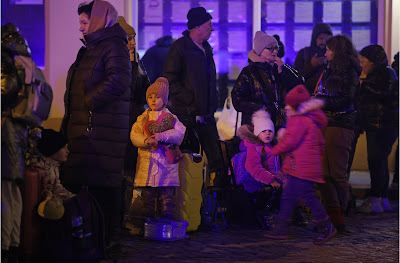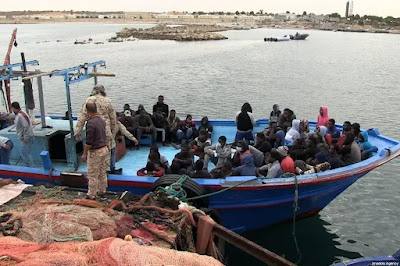by Cindy Hill
 |
People who have arrived from Ukraine wait to board a bus outside the main railway station in Przemysl, Poland, on March 12. Credit: Sean Gallup/Getty Images via The Washington Post, March 13, 2022. |
 |
| A boat carrying around two dozen migrants capsized in the Mediterranean Sea off the coast of Libya on Saturday, with at least 19 people missing and presumed dead, authorities said. Libya’s coast guard said that a group of 23 migrants—both Egyptians and Syrians—set off from the eastern city of Tobruk earlier in the day. Three migrants were rescued and taken to hospital. Only one body was retrieved and search efforts were ongoing, the agency said. The shipwreck is the latest tragedy at sea involving migrants trying to cross the Mediterranean from the North African nation in a desperate attempt to reach European shores. Libya has emerged as the dominant transit point for migrants fleeing war and poverty in Africa and the Middle East, hoping for a better life in Europe. —The Washington Post, March 13, 2022. Photo: Migrants in Tripoli, Libya on 19 October 2021. Credit: Stringer/Anadolu Agency via Middle East Memo, March 14, 2022. |
I dreamt about a girl, thirteen years old,
walking from Kyiv wearing a dark teal down
puffer coat, a white knit hat with pompom,
and her cousin’s moon boots, which kept the cold
away, though they’d seen better days. She rolled
her eyes and tugged her earbuds out, then frowned
and waited for her brother. She sat down
on tumbled piles of broken concrete, scrolled
through her phone, then arms-length, took a selfie.
I never dreamt a girl in Syria
was walking to the border of Turkey,
or of a girl escaping Libya
by boat, destined to sink in storms of dread,
though each had been alive, and now was dead.
My deep-sleeping brain may have remembered
how my great-grandmother’s remaining kin—
slaughtered by Ceausescu on a mountain
pass—were not so far away, as black birds
fly; and those wheat fields that I’ve seen pictured
on the news called to mind her deep-scarred shins,
sliced by brother’s scythe as they dropped grain in
sheaves then stacked in golden stooks. English words
could not console her for what had happened.
I dreamt about a girl whose looks I knew,
whose patterns were the same as those I’ve drawn
in cross-stitch on a pillowcase in blue
and gold or black and red, in sheaves of wheat
I’ve etched with cotton thread. I never dreamt
of girls whose stories I have never read,
though they had been alive, and now are dead.
Cindy Ellen Hill is an attorney, writer, musician and obsessed gardener living in Middlebury VT. She is that author of Wild Earth, a collection of sonnets from Antrim Press, and Elegy for the Trees, a book of sonnets upcoming from Kelsay Books. Her poetry has been published in Vermont Magazine, the Minison Project, PanGaia, Sagewoman, WildEarth, Vermont Life, Measure, the Classical Poets Society online, Ancient Paths online, The Lyric, and the National Public Radio Themes and Variations program. She is presently an MFA student at the Vermont College of Fine Arts.